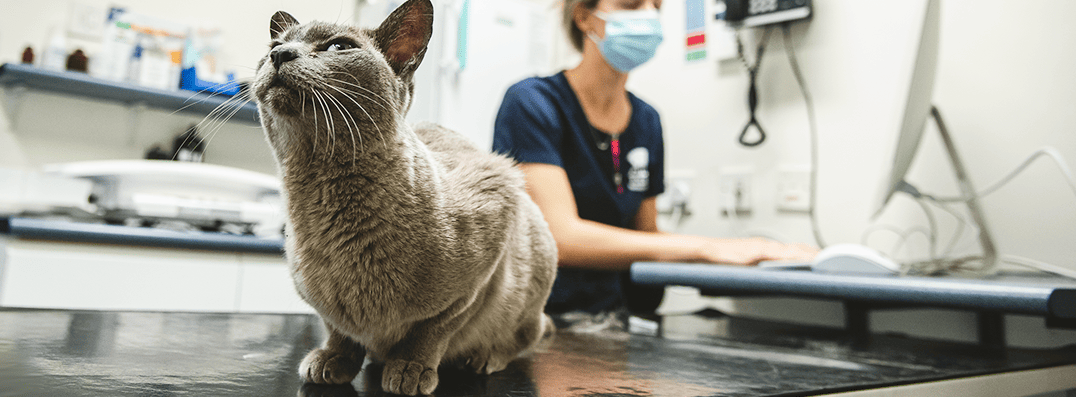Our radioiodine treatment service for hyperthyroid cats is currently closed. Anderson Moores, another member of the Linnaeus family, offers this service should you wish to explore this option.
What is Hyperthyroidism?
Hyperthyroidism is a very common disorder affecting older cats, it is caused by the overproduction of thyroid hormones. Like people, cats have two thyroid glands on either side of the neck.
Thyroid hormones are responsible for many processes in the body, including the regulation of body metabolism. Cats with hyperthyroidism tend to burn up energy too rapidly and typically suffer weight loss despite having an increased appetite and increased food intake. Cats vary in how they respond to the disorder, meaning that cats may vary with the clinical signs they show. The clinical signs of hyperthyroidism can be dramatic in some cats and as a result, they can become very unwell. If left untreated, it can put your cat's organs including the heart under a lot of strain leading to organ damage and heart disease/failure.
Clinical signs:
- Weight loss
- Increased appetite
- Vocalising/behavioural changes
- Poor hair coat or coat changes
- Diarrhoea or vomiting
- Increased drinking
- Goitre – increased thyroid gland in the neck
Less commonly, owners might notice that their cats are panting, listless, having difficulty breathing, eating little, behaving oddly, or seeking cool places.
Causes
Most of our hyperthyroid patients are affected by benign nodular hyperplasia, a very low percentage of cats have a cancerous tumour of the gland known as adenocarcinoma.
Diagnosing hyperthyroidism
If the clinical signs and history fit, your vet will carry out a blood test to check the thyroid levels. As hyperthyroidism is a disease of older cats, this may mean that they have other problems including kidney disease or heart disease. The vet will usually check the kidney parameters at the same time as the thyroid blood test and throughout management of the disease. Blood pressure and heart investigation may be required.
The good news is the disease is manageable and there are many different options with regards to managing/treating the condition, these include:
- Medication: in the form of tablet, liquid or transdermal gel applied to the pinna (off licence product). If you cat is easy to medicate this can be a good management option. Side effects can include vomiting, rashes, loss of appetite and sometimes blood abnormalities.
- Food: a special diet called Hills Y/D. This is low in iodine so that thyroid hormones cannot be made. If your cat eats any other food whilst on this food, it will make this treatment ineffective.
- Surgery: to remove an abnormal thyroid gland. This can be a permanent cure but does require a general anaesthetic. In some cats the other thyroid gland is also abnormal, and the hyperthyroidism can come back. Some cats also have thyroid tissue in their chest that is not easily accessible with surgery.
- Radioiodine: Iodine is used to make thyroid hormone. Iodine that is radioactive will destroy abnormal thyroid cells. This is an extremely effective treatment (about 95% of cats respond to a single injection) that resolves the hyperthyroidism quickly and painlessly. The iodine can be injected under the skin in the scruff of the neck (just like a vaccine) or given as a capsule.
The drawback is that cats need to spend some time in a special isolation facility (up to 2 weeks) while eliminating almost all of the radioactivity before returning home. Owners cannot visit in this time period.
Radioiodine
We are delighted that here at Forest Veterinary Centre at Eastwick Lodge Farmhouse, Harlow, we have our own Radioiodine Treatment Centre. Radioiodine is given by a single injection under the skin while your cat is sedated. Your cat will stay at Forest Veterinary Centre for up to two weeks after the injection and will then need to stay indoors for two more weeks once they return home. There is natural daylight in the cattery and 24-hour CCTV monitoring of the patients, our radioiodine nurses go in to the radioiodine unit to check on patients daily.
Radioiodine treatment costs £2,500 inc VAT but excluding the pre and post treatment tests. At Forest Veterinary Centre, every effort is made to reduce the risk of complications or problems while your cat is with us. Louise Knowlden our Lead Vet at Harlow (covering Alex Shutes), and our qualified nurse Sharon Hasty is supervising the Radioiodine unit.
If your cat meets the following criteria and you would like to enquire about radioioidine for your cat please speak to your vet about a referral:
- Your cat must have a high thyroid hormone concentration confirmed by your Vet.
- Your cat’s general health must be good. If there are any underlying illnesses, they should be discussed with your vet and our referral team. Due to the nature of the treatment, radiation exposure to our nurses and vets must be minimised. Therefore, whilst your cat is here, we cannot handle him/her including grooming and treating them if they were to become ill. While medications may be placed in food, they cannot be given directly. Therefore, if your cat has significant medical problems, other than hyperthyroidism, he/she may not be suitable for this treatment.
- Your cat must be reasonably well behaved. We understand that cats with hyperthyroidism can be irritable and show behavioural changes, but we cannot treat cats that will try to attack us as we care for them.
- Ideally a blood test is done to check kidney function when the thyroid problem is controlled with medication prior to treatment with radioactive iodine. Hyperthyroidism boosts the metabolism and can hide problems such as kidney disease. Medical treatment is not possible in some cats, either because the drugs do not work well or cause adverse reactions. This will not usually stop us from treating your cat with radioactive iodine.
- We recommend that your cat has a heart scan prior to admission especially if they have a murmur or gallop rhythm on clinical exam – this can be discussed with your vet. We can offer this scan as a referral service but this would need to be performed a minimum of 2 weeks before admission.
- Tablets controlling thyroid hormone levels or the Y/D diet should then be stopped two weeks before your cat’s appointment with us.
- Have an external laboratory thyroid blood test one week before admission.
- Your cat must be up to date with vaccinations for cat flu and now showing any signs of potential flu.

